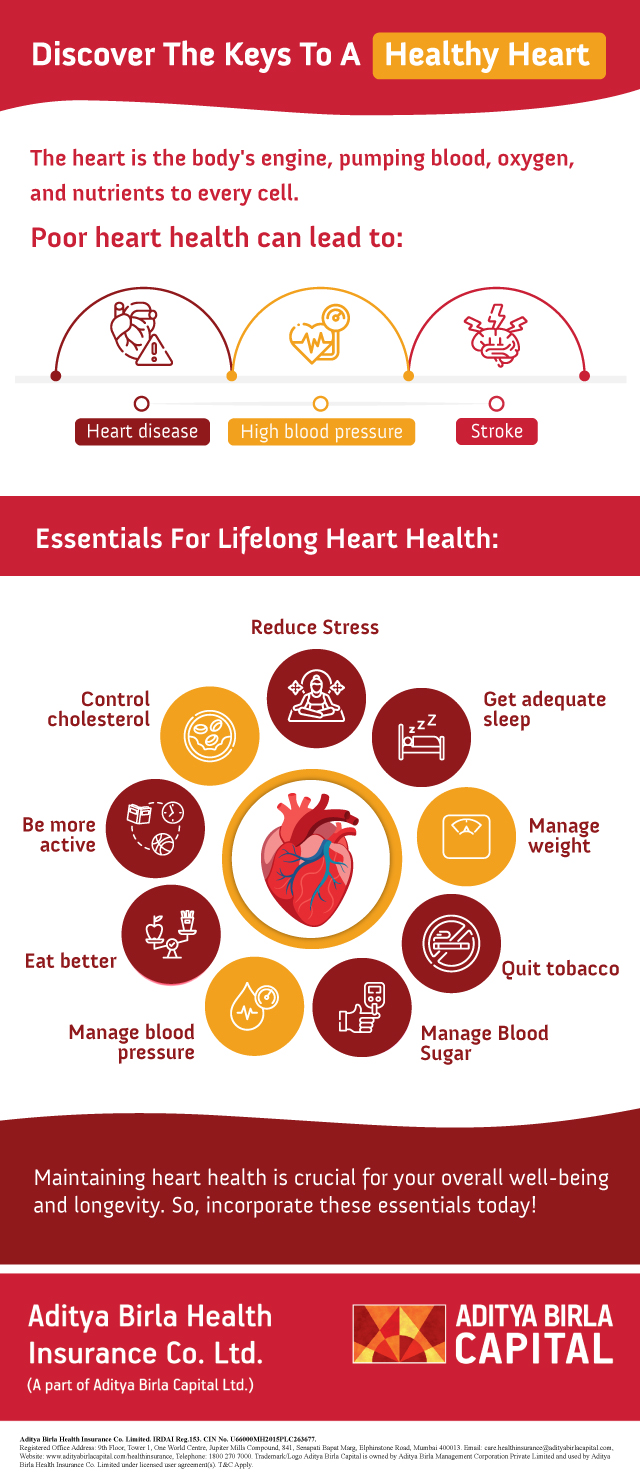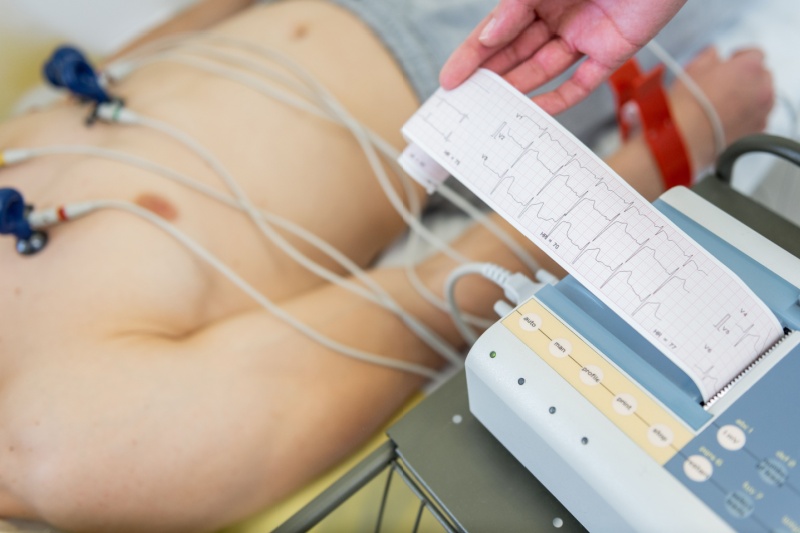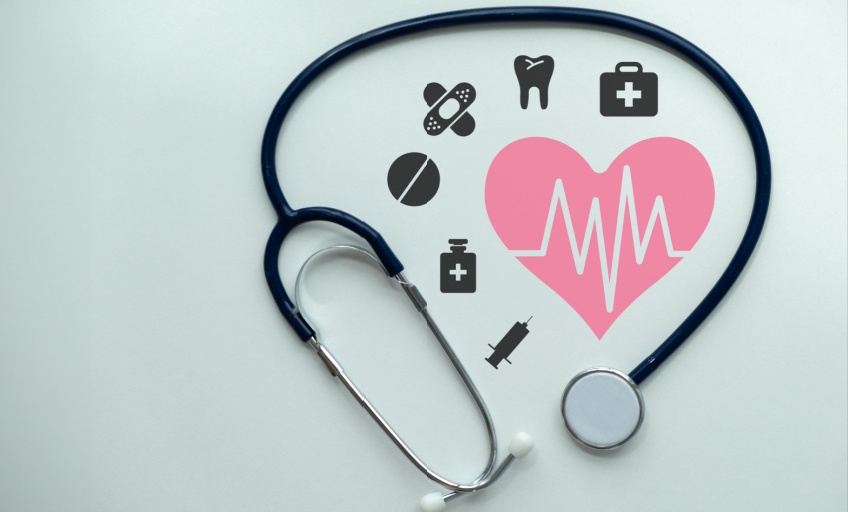
There’s promising news when it comes to your heart. While heart disease is prevalent in India, your odds of avoiding it can be surprisingly good if you practise a few basic health habits.
What you need to know:
8 Essentials: A Healthy Heart Checklist
Here is your healthy heart checklist for improving and maintaining cardiovascular health:
Regular physical activity
Adults should get a weekly total of at least 150 minutes of moderate aerobic activity, 75 minutes of vigorous aerobic activity, or a combination of both, spread throughout the week.
- Be Strong: Include muscle-strengthening activity (like resistance or weight training) at least twice weekly.
- Add Intensity: Increase time, distance, amount, or effort for more benefits.
- Sit Less: Get up and move throughout the day. Kids and teens should get at least 60 minutes of physical activity daily, including play and structured activities.
A balanced diet

Make smart choices and swaps to build an overall healthy eating style. Watch calories and eat smaller portions.
- Consume a balanced diet rich in vegetables, fruits, whole grains, beans, legumes, nuts, plant-based proteins, lean animal proteins, skinless poultry, fish, and seafood.
- Limit sweetened drinks, alcohol, sodium, red and processed meats, refined carbohydrates like added sugars and processed grain foods, full-fat dairy products, highly processed foods, and tropical oils like coconut and palm.
- Avoid trans-fat and partially hydrogenated oils (found in some commercial baked goods and fried foods).
Quit smoking
A smoker’s risk of developing coronary heart disease is 2 to 4 times that of a nonsmoker. The use of inhaled nicotine delivery products, which includes traditional cigarettes, e-cigarettes, and vaping, is one of the leading causes of preventable death. They contain many toxic chemicals, as do their smoke, vapor, and liquids. Smoking damages your circulatory system and increases your risk of multiple diseases. Thus, you must quit smoking at all costs.
Managing stress
Find healthy stress outlets. Avoid self-medicating when you are under stress. It’s better to offload stress with exercise, yoga, or social activities than alcohol, emotional eating, or binge-watching TV. Cool down with relaxation activities like meditation or anger-management classes. Johns Hopkins research on young men has shown that those who often have angry outbursts have a nearly three times higher risk of premature heart disease and five times higher risk of heart attack.
Blood pressure monitoring
Keeping your blood pressure within acceptable ranges can keep you healthier for a longer period. Levels less than 120/80 mm Hg are optimal. High blood pressure is 130-139 mm Hg systolic pressure (the top number in a reading) or 80-89 mm Hg diastolic pressure (bottom number). A diagnosis of high blood pressure must be confirmed with a medical professional. A doctor should also evaluate any unusually low blood pressure readings. He can take blood pressure readings and provide recommendations.
Regular cholesterol checks
High cholesterol levels, especially “Bad Cholesterol” and triglyceride, can lead to heart disease. A healthcare professional can measure blood cholesterol and help you understand what the levels mean. He can consider non-HDL cholesterol as the preferred number to monitor, rather than total cholesterol because it can be measured without fasting beforehand and is reliably calculated among all people. Track your cholesterol levels over time and take steps to reduce high cholesterol.
Electrocardiogram

An electrocardiogram (ECG) is a simple, non-invasive test that measures the heart’s electrical activity. It is used to help diagnose and monitor heart conditions, including:
- Abnormal heart rhythms
- Heart attack
- Coronary artery blockage
- Damaged heart muscle
- Enlarged heart
- Pericarditis
A normal ECG shows a heart beating at a steady rate of 60 to 100 beats per minute, with a consistent and even rhythm. A doctor may recommend an ECG if you are experiencing symptoms like chest pain, breathlessness, dizziness, fainting, and palpitations.
Family history and genetics
Genes are passed down from parents to children and can affect the strength of blood vessels and how heart cells communicate. Some common inherited conditions include cardiomyopathies (heart muscle diseases), channelopathies (life-threatening heart rhythms), and familial hypercholesterolemia (very high cholesterol levels). Family members may share environments and habits that increase the risk of heart disease, such as unhealthy eating habits or a sedentary lifestyle. If you have a family history of heart disease, you can:
- Collect it and share it with your healthcare provider
- Discuss the risk of heart disease and lifestyle changes that can be made with your children and siblings
- Take steps to lower your chances of having heart disease, as advised
Age and gender
There are several differences between men and women in terms of heart disease risk and prevalence:
- Age – The risk of heart disease increases with age, especially for people over 65 and people of color. The average age of a first heart attack is 65 years for men and 72 years for women. However, the incidence of heart disease in people under 50 years of age has been increasing in recent years.
- Gender – Men generally develop cardiovascular disease (CVD) at a younger age and have a higher risk of coronary heart disease (CHD) than women. Women, on the other hand, are at a higher risk of stroke, which often occurs at older age.
High blood pressure and cholesterol
High blood pressure and high cholesterol are linked and can both increase your risk of heart disease and stroke:
- High cholesterol can cause high blood pressure. When cholesterol builds up in your arteries, it can make them narrow and hard, which makes it harder for your heart to pump blood. This causes your blood pressure to increase.
- High blood pressure can damage arteries and create places for cholesterol to build up.
- High blood pressure and high cholesterol increase stroke risk by nearly three and a half times.
- Make the mentioned lifestyle changes to improve both these conditions.
Diabetes and metabolic syndrome
Metabolic syndrome (MetS) is a group of risk factors that increase the risk of developing diabetes, heart disease, and stroke. The risk factors include high blood pressure, high triglyceride levels, low HDL cholesterol levels, abdominal obesity, and impaired fasting glucose. To be diagnosed with MetS, you must have at least three of these risk factors. To prevent MetS, you must implement the steps mentioned above.
Your heart is a vital organ supporting your life. Keep your heart in shape by following the healthy heart checklist every day. To ensure you follow it daily to reap its maximum benefits, take its screenshot and stick it in your rooms.
Stay tuned to the Activ Living Community. Keep up to date with the latest health tips and trends through expert videos, podcasts, articles, and much more on nutrition, fitness, mindfulness, and lifestyle conditions like Asthma, Blood Pressure, Cholesterol, and Diabetes. Activ Living ke saath sahi sehat ki shuruat ABHI karo.
You may also be interested in the following blogs:
Popular Searches
How to lower blood pressure | Fruits good for liver | Unhealthy foods | Ragi Benefits | Basal Metabolic Rate | Acupressure points for High Blood Pressure | Ayurvedic medicine for blood pressure | How to control cholesterol at home | Homeopathy for Asthma | Biological Age | Home remedies for TB | Natural beta blockers | Negative effects of internet | Types of walking | Blood pressure calculator | Blood sugar calculator | BMI Calculator





 1800-270-7000
1800-270-7000








